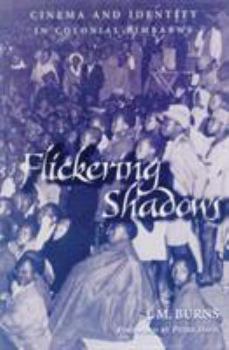Flickering Shadows: Cinema and Identity in Colonial Zimbabwe
Every European power in Africa made motion pictures for its subjects, but no state invested as heavily in these films, and expected as much from them, as the British colony of Southern Rhodesia. Flickering Shadows is the first book to explore this little-known world of colonial cinema. J. M. Burns pieces together the history of the cinema in Rhodesia, examining film production, audience reception, and state censorship, to reconstruct the story of how Africans in one nation became consumers of motion pictures. Movies were a valued "tool of empire" designed to assimilate Africans into a new colonial order. Inspired by an inflated confidence in the medium, Rhodesian government offcials created an African Film industry that was unprecedented in its size and scope. Transforming the lives of their subjects through cinema proved more complicated than white officials had anticipated. Although Africans embraced the medium with enthusiasm, they expressed critical opinions and demonstrated decided tastes that left colonial officials puzzled and alarmed. Flickering Shadows tells the fascinating story of how motion pictures were introduced and negotiated in a colonial setting. In doing so, it casts light on the history of the globalization of the cinema. This work is based on interviews with white and black filmmakers and African audience members, extensive archival research in Africa and England, and viewings of scores of colonial films.
Format:Paperback
Language:English
ISBN:0896802248
ISBN13:9780896802247
Release Date:April 2002
Publisher:Ohio University Press
Length:306 Pages
Weight:0.81 lbs.
Dimensions:0.7" x 5.6" x 8.7"
Customer Reviews
1 rating
Why Not a Movie?
Published by Thriftbooks.com User , 23 years ago
As a student of Sub-Saharan Africa I found this history of British Empire propaganda efforts through cinema showings in Rhodesia fascinating reading. This is the stuff of great drama -- the British investment in moving picture development and censorship efforts directed at forging a "tool of Empire" in order to pacify Africans and assimilate them into the new colonial order. Most of othe propaganda tools later employed by the Nazis in Germany and the Soviets in Russia were originally in play in the prolonged and heavily subsidized business of developing a cinema oriented to promoting the white rule administrations. The book is a fast paced, engrossing read -- if there is one criticism to be levied it seems that perhaps in the interest of brevity the author passed over quickly some of the engrossing tales of how certain motion pictures were required to be bowdlerized in order to negotiate them into a colonial atmosphere. For example, a full chapter might have been devoted to the reaction of the Rhodesian natives to cowboy movies, a campaign that stretched over decades, changing in scope and intent to accommodate the growing sophistication of the native audiences. Has anyone made an attempt to produce a motion picture not centered in the Hollywood concept of African colonialism? Perhaps the author has this in mind for a future project -- I would look forward to watching a drama concerned with Rhodesian cinema development in a style of "Out of Africa" presentation, demonstrating the power of film to shape credulous audiences, and how that same influence backfired in fomenting political unrest and revolution.





